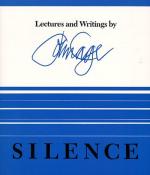
|
| Name: _________________________ | Period: ___________________ |
This test consists of 5 short answer questions, 10 short essay questions, and 1 (of 3) essay topics.
Short Answer Questions
1. In what month were all three parts of "Composition as Process" given?
2. What composer wrote "The Art of the Fugue"?
3. What college was Cage attending when he took a course where he wrote in the manner of Gertrude Stein?
4. Who wrote "Psychology--never again"?
5. In the "Definitions" section of "Forerunners of Modern Music," what term is "sound and silence"?
Short Essay Questions
1. How does Cage think most people feel about experimentation?
2. Describe the anecdote used at the conclusion of "Composition as Process--2: Indeterminacy" about Dr. Suzuki.
3. What does Cage believe the future holds for sounds that are heard on a regular basis?
4. How does Cage answer his own question about whether music can be composed without writing it in pencil or ink?
5. In "Experimental Music: Doctrine," how does Cage respond when asked what he had to say about rhythm?
6. In the book's Foreword, how does Cage describe the way the writings and lectures in his book are written and presented?
7. How does Cage go about exploring the work of each composer he mentions in "Composition as Process--2: Indeterminacy"?
8. Why did Cage allow his creations to be called "experimental" after once resisting the title?
9. Describe what Cage said about the French and the Italians in a conversation he recalls having at a Venetian restaurant.
10. How much concern do Cage and his colleagues seem to have about how their work is perceived and received by its hearers?
Essay Topics
Write an essay for ONE of the following topics:
Essay Topic 1
Explore the contrast created in Cage's essay which is an imaginary conversation between himself and Erik Satie. Discuss the mathematical presence in Cage's parts in relation to the near-poetic sensibility revealed in Satie's part. Why do you think the author takes this tone for his parts? Do you think he is really so cold about Satie? Why or why not?
Essay Topic 2
Explore Cage's use of personal anecdotes throughout the book. What seems to be the purpose of his lecture made up of anecdotes? What reason does Cage give for including it? What purpose do the anecdotes seem to serve in this chapter and throughout the book? How do the anecdotes represent a larger idea about relationships?
Essay Topic 3
What is the significance of the series of anecdotes relating the perspective of various innovators in philosophy and art that only the present is important found in "History of Experimental Music in the United States"? Looking at each of the three anecdotes, what do they have in common, aside from their overall theme? In the article, does Cage ever say whether he agrees or disagrees with these sentiments? How does he seem to feel about the past and the future?
|
This section contains 861 words (approx. 3 pages at 300 words per page) |

|




